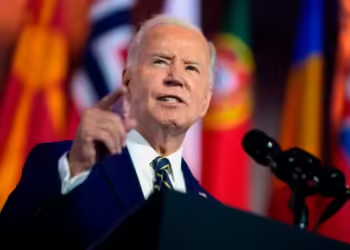China Offers the Taliban a Warm Welcome While Urging Peace Talks
Worried about the war in Afghanistan, China has stepped up diplomatic efforts with the government and the group to encourage a political settlement after the U.S. withdrawal.
The New York Times
By Steven Lee Myers
China offered a high-profile public stage to the Taliban on Wednesday, declaring that the group rapidly retaking large parts of Afghanistan would play “an important role in the process of peaceful reconciliation and reconstruction” of the country.
Chinese officials began two days of talks with a delegation of Taliban leaders in Tianjin, a coastal city in northeastern China, significantly raising the group’s international stature after steady military gains that have taken advantage of the withdrawal of American and NATO combat forces from Afghanistan.
China’s foreign minister, Wang Yi, called the Taliban “a pivotal military and political force,” but urged their leaders “to hold high the banner of peace talks,” according to a statement by the Ministry of Foreign Affairs.
He pressed the group to work to burnish its diplomatic image and extracted a public pledge that the group would not allow fighters to use Afghan territory as a base to carry out attacks inside China, according to the statement.
The Taliban have been on a regional diplomatic blitz over the last month, visiting Tehran, Moscow and the Turkmenistan capital Ashgabat for talks with officials, as their military ascendancy in Afghanistan has grown. The increasing legitimacy bestowed on the insurgents by regional leaders has been met largely with public silence from the Kabul government, and Wednesday’s visit to Beijing was not an exception.
The visit to Tianjin was the Taliban’s most significant diplomatic coup yet.
Chinese officials have met with Taliban envoys before, including a meeting in Beijing in 2019, but not at such a high level and in such a public way. This meeting underscores how much the former rulers of the country, who were toppled by the United States 20 years ago after the Sept. 11 attacks, have succeeded in reshaping how international powers deal with them.
The foreign ministry and the Chinese state news media showed Mr. Wang warmly greeting Mullah Abdul Ghani Baradar, the deputy leader of the Taliban, and also posing with other Chinese diplomats and all nine members of the Taliban delegation.
Intentionally or not, the display was a sharp contrast to the frosty reception that he and other Chinese officials had offered in Tianjin two days earlier to Wendy R. Sherman, the American deputy secretary of state.
Barnett R. Rubin, a former State Department official and United Nations adviser on Afghanistan who is a senior fellow at New York University’s Center on International Cooperation, said the meeting in China was not a show of support for the Taliban but for a peaceful end to the war.
“It is an effort to use China’s influence to persuade the Taliban not to seek a military victory but to negotiate seriously for an inclusive political settlement,” he said.
China has showed growing concern about the fate of Afghanistan. It shares a short border with China at the end of a narrow, mountainous region called the Wakhan Corridor. Last month, Taliban forces seized much of the province, which borders Xinjiang, a largely Uyghur Muslim region in western China where the government has detained hundreds of thousands in the name of fighting extremism.
Mr. Wang once again on Wednesday criticized the United States and its NATO allies for a hasty withdrawal that could again plunge the country into chaos, according to the ministry statement.
Although it has not said so explicitly, China appears to be trying to act as a mediator between the Afghan government and the Taliban, encouraging some sort of political settlement.
China has long sought to play a larger diplomatic role in Afghanistan, but it was always overshadowed by the outsize influence of the United States as the leader of the military mission supporting the government in Kabul. That may be changing now that the Americans have largely withdrawn combat forces and the Taliban appear to have the military initiative.
China’s leader, Xi Jinping, spoke by telephone with Afghanistan’s president, Ashraf Ghani, on July 16, and also urged his government to find “an Afghan-led and Afghan-owned” solution.
Although China long criticized the American military involvement in Afghanistan, it also relied on it to help contain what it considered crucial to its security: the use of the country as a base for extremists fighting for the independence of Xinjiang, which separatists call East Turkestan.
After the Sept. 11 attacks, the United States designated the East Turkestan Islamic Movement as a terrorist organization, in part to cultivate China’s support for American efforts in the “war on terror.”
The Trump administration revoked the designation last year, saying there was no evidence that the group continued to carry out attacks, an assertion that China disputes. China has cited the threat of Uyghur extremism as a reason for its mass detention camps in Xinjiang.
China has other interests to protect in Afghanistan as well. It has made considerable investments in the country, including a pledge to spend $3 billion to develop the Aynak copper mine. Many of those investments have remained stalled because of the country’s instability.
Chinese officials have in recent months signaled that Afghanistan could benefit from development projects under the country’s Belt and Road Initiative, a global effort to invest in infrastructure.
The Taliban, in previous statements, have said they would welcome Chinese investments. On Wednesday, a spokesman for the Taliban’s political office, Mohammad Naeem, thanked China for extending an invitation to meet, according to a statement posted on Twitter. The group appeared eager to address China’s main concern.
“The Islamic Emirate,” he said, “assured China that Afghan territory will not be used against the security of any country.”
Najim Rahim and Adam Nossiter contributed reporting. Claire Fu contributed research.









